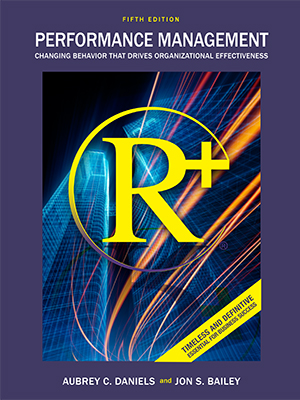Bridging the Gap with OBM
 Clinical psychologist, organizational and social psychologist, business consultant: these four pursuits would keep the busiest person’s calendar full. Now add politician, yoga instructor, researcher, and writer and you will have a brief profile of Marius Rietdijk, assistant professor of business administration at Vrije Universiteit in Amsterdam. Rietdijk began to discover a common thread in many of his interests decades ago, when during his studies, he questioned why industrial organizational psychology employed none of the learning theories offered by clinical psychology. “I thought that I must find out more about the applications of learning theory in companies,” he said. He had no idea at the time that his quest for information would eventually take him on a journey to America and beyond.
Clinical psychologist, organizational and social psychologist, business consultant: these four pursuits would keep the busiest person’s calendar full. Now add politician, yoga instructor, researcher, and writer and you will have a brief profile of Marius Rietdijk, assistant professor of business administration at Vrije Universiteit in Amsterdam. Rietdijk began to discover a common thread in many of his interests decades ago, when during his studies, he questioned why industrial organizational psychology employed none of the learning theories offered by clinical psychology. “I thought that I must find out more about the applications of learning theory in companies,” he said. He had no idea at the time that his quest for information would eventually take him on a journey to America and beyond.
 The first stepping stone took the form of a book on organizational behavior management. Rietdijk read the book and wrote a summary for a Dutch management journal as well as a subsequent book chapter on the subject; both publications generated interest in the local business community. Then working as a senior researcher at Nyenrode University, a business school in Holland, he came across Beth Sulzer-Azaroff’s book, Behavior Analysis for Lasting Change in which she referred to and recommended the work of Aubrey Daniels. “I had changed a bit from psychology to business schools, but I was still very excited about behavior analysis,” says Rietdijk. “I read everything I could of Skinner’s, and also Performance Management Magazine and the Journal for Organizational Behavior Management (JOBM). Then one day, my professor said, ‘You should go and see those people in America.’ The first person I met was Aubrey and he was so kind that he asked me to stay in Atlanta for a few weeks to take courses.” This pivotal meeting took place in 1995. Rietdijk regrettably couldn’t stay for the courses, as his trip had already been mapped out—a rigorous agenda that also took him to Detroit, Western Michigan University, and New York to meet with other movers and shakers of the behavioral community. “For me it was reinforcing of course, having read a lot about behaviorists, behavior analysis, and [Organizational Behavioral Management] OBM, and then I made the appointment with Aubrey that I could come back another time to do courses and to have my PM Basics Certification, so that I could also apply this in Dutch companies.”
The first stepping stone took the form of a book on organizational behavior management. Rietdijk read the book and wrote a summary for a Dutch management journal as well as a subsequent book chapter on the subject; both publications generated interest in the local business community. Then working as a senior researcher at Nyenrode University, a business school in Holland, he came across Beth Sulzer-Azaroff’s book, Behavior Analysis for Lasting Change in which she referred to and recommended the work of Aubrey Daniels. “I had changed a bit from psychology to business schools, but I was still very excited about behavior analysis,” says Rietdijk. “I read everything I could of Skinner’s, and also Performance Management Magazine and the Journal for Organizational Behavior Management (JOBM). Then one day, my professor said, ‘You should go and see those people in America.’ The first person I met was Aubrey and he was so kind that he asked me to stay in Atlanta for a few weeks to take courses.” This pivotal meeting took place in 1995. Rietdijk regrettably couldn’t stay for the courses, as his trip had already been mapped out—a rigorous agenda that also took him to Detroit, Western Michigan University, and New York to meet with other movers and shakers of the behavioral community. “For me it was reinforcing of course, having read a lot about behaviorists, behavior analysis, and [Organizational Behavioral Management] OBM, and then I made the appointment with Aubrey that I could come back another time to do courses and to have my PM Basics Certification, so that I could also apply this in Dutch companies.”
By then, Rietdijk had completed his studies in clinical, organizational, and social psychology. He decided to begin work on his doctorate in economics and business administration, but he wanted to focus his thesis on OBM. No such concentration of study existed in Holland, but that didn’t deter Rietdijk, who proceeded to develop a Ph.D. thesis based on OBM while convincing his professors of its validity. “They didn’t really know much about it or really understand it, but I was convinced by the literature,” he explains. “I had to in fact shape the community here in my direction so that they understood what I was proposing.”
The Ph.D. was twenty years in the making while Rietdijk worked as a tenured professor with a continuing goal to bridge the gap between academia and the business world. In an interview with Valentin Bejan entitled “Rigor and Relevance in Business Science” he explains that both communities could prosper by applying OBM methods: “As a consultant you must show that you really made a difference in a company. There are research methodologies for doing that; for example, taking a baseline measure of performance. Many consultant colleagues are more focused on relevance, but not on rigor. They don’t really prove whether their work has an effect . . . Academic colleagues are more focused on scientific research, not so much on relevance. Both rigor and relevance are getting more and more important in the future.”
 While working on his doctorate, Rietdijk kept his long-awaited appointment with Aubrey Daniels. He returned to America, completed his advanced performance management training and PM Basics Certification, and soon afterward conducted his first three-day workshop in Holland. For a time, he left the world of academia to work as an OBM consultant, and operates his own firm today; but both worlds remain a draw for Rietdijk, who also works as a professor and teacher. In fact, Rietdijk has achieved another milestone: his thesis has begun to bridge the gap between his business and academic colleagues. “It starts with the very simple case of a parakeet that I trained—a funny case to begin the story. Then I apply OBM methods to a small department of a factory. Next, I increase the level of analysis, because I found in the OBM literature that we should not only look at the department level but also at the large-scale level. I made some minor changes and a publisher wanted to publish it,” he says. “Because they had not published anything at all about OBM in Holland, I thought that I should publish it first in Dutch.”
While working on his doctorate, Rietdijk kept his long-awaited appointment with Aubrey Daniels. He returned to America, completed his advanced performance management training and PM Basics Certification, and soon afterward conducted his first three-day workshop in Holland. For a time, he left the world of academia to work as an OBM consultant, and operates his own firm today; but both worlds remain a draw for Rietdijk, who also works as a professor and teacher. In fact, Rietdijk has achieved another milestone: his thesis has begun to bridge the gap between his business and academic colleagues. “It starts with the very simple case of a parakeet that I trained—a funny case to begin the story. Then I apply OBM methods to a small department of a factory. Next, I increase the level of analysis, because I found in the OBM literature that we should not only look at the department level but also at the large-scale level. I made some minor changes and a publisher wanted to publish it,” he says. “Because they had not published anything at all about OBM in Holland, I thought that I should publish it first in Dutch.”
Rietdijk’s thesis, Organisaties conditioneren. De invloed van beloning en straf op werkprestaties (Conditioning Organizations: The influence of reward and punishment on work performance) was published by the VU University Press. “It connects OBM with mainstream management journals, and is readable for undergraduates,” Rietdijk explains. “Van Gorcum publishers have published a simpler version named Gedragsverandering in Organisaties. Hoe het beste van mensen gedaan te krijgen (Behavioral change in organizations: How to get the best from people). This book avoids the academic contribution of OBM to management science, but just explains and gives an overview of OBM. It got more distribution and was nominated to be one of the best three books of the last two years contributing to bridge the gap between HRM/Organizational theory and practice. It was not the winner, but still a nominee out of hundreds of books.” Rietdijk is currently in the process of translating the book into English.
Rietdijk believes that keeping a foot in both business and academia can further achieve his goals. “I am still doing consulting because I think if you want to have good data for scientific articles, you must also do intervention work. I think we need the practical interventions in real life and also the other way around.
“There is a big gap between theory and practice and that is also how I think OBM can help business science. If we understand the needs of business, we can offer a contribution to business. That may be how my thesis can contribute, by marketing the field of OBM to a broader and also scientific management community. I have relationships here with the business community and also behavior management scientists, and I am convinced that OBM can really contribute to help management solve problems.”
In a project with Dutch Railways, Rietdijk’s consulting firm emphasized the importance of social reinforcement described as “compliments linked to performance.” Managers monitored the contingent reinforcers that they gave throughout the day in the form of positive comments about specific performance. “It worked so well that we decided to start a website (plimenten.com) to give everyone in the world a chance to monitor their compliments/verbal reinforcement and set goals. We included an entire performance management system on the Web as a learning program for managers,” says Rietdijk.
He also offers interactive workshops to introduce people to and educate them about behavioral methods. “I ask people in the audience what their issues are with regards to behavior. We select a behavior and I do an ABC analysis with the group without telling them it’s an ABC analysis,” he says. “I draw two columns, A and C, on a flipchart, and I write what they say about what is affecting the occurrence of that behavior. I put the things they say in either the antecedent column or the consequence column. Very quickly, the antecedent column fills up, because they use antecedents all the time if they want to change behavior. However, after explaining the ABC model, they understand the importance of positive, immediate and certain consequences.”
Recently, Rietdijk was invited to conduct a four-day workshop in Sardinia, Italy, sponsored by the Sardinian government. “The students appreciated the practical application (OBM), for which I used the book of the Daniels brothers and ADI’s fluency program. Because of the good evaluations, they immediately invited me to return next year. How reinforcing can behavior analysis be?” he remarks.
 Picking up a book on behavioral management practices made a lasting impact on Rietdijk’s life. He sees behavioral strategy and effect in every aspect of his career and personal interests. Rietdijk also owns and operates his own yoga studio and states that he now sees meditation—which he teaches and practices—as a behavioral therapy that incorporates a systematic approach to relaxation. This observation may very well lead him down another path of discovery. “Relaxation is just a physical phenomena; I don’t see it as a mental thing,” he explains. “I think that yoga’s stretching and relaxation techniques are very systematic. I don’t think I’ve read anything about the behavior analytical view of meditation, but I’m really excited about it.”
Picking up a book on behavioral management practices made a lasting impact on Rietdijk’s life. He sees behavioral strategy and effect in every aspect of his career and personal interests. Rietdijk also owns and operates his own yoga studio and states that he now sees meditation—which he teaches and practices—as a behavioral therapy that incorporates a systematic approach to relaxation. This observation may very well lead him down another path of discovery. “Relaxation is just a physical phenomena; I don’t see it as a mental thing,” he explains. “I think that yoga’s stretching and relaxation techniques are very systematic. I don’t think I’ve read anything about the behavior analytical view of meditation, but I’m really excited about it.”
When he started his consulting firm, Rietdijk found that networking seemed the best way to spread the word about OBM technology, and he soon found himself involved with local politics. Today he is a city councilor in his town of Amstelveen, where he not only talks with local journalists about behavioral methods, but applies those methods himself. “In politics, it is very customary to fight with and punish each other,” he comments. “But I am not punishing. I just want to shape good behavior. I want to give compliments to the right behaviors to improve performance. Then the atmosphere improves and the results also improve.”
Today Rietdijk is a strategic partner with Aubrey Daniels International and he serves on an advisory board at the Cambridge Center for Behavioral Studies. He says, with a laugh, that for him, being around behavioral scientists is like being in a “sweet shop” and with equal humor describes himself as “almost like a priest who studies behavior analysis.”
“I hope I have made the point clear that you can connect behavioral analysis and methods to not only companies and all levels of an organization, but to one’s daily life—your pets, your family, your children—and even apply it at the society level,” he says. Rietdijk has made that clear, not only through words but through specific, observable, and very positive action. In short, as Aubrey Daniels might say, when it comes to behavior analysis, Rietdijk “walks the talk.”
Published January 4, 2011


